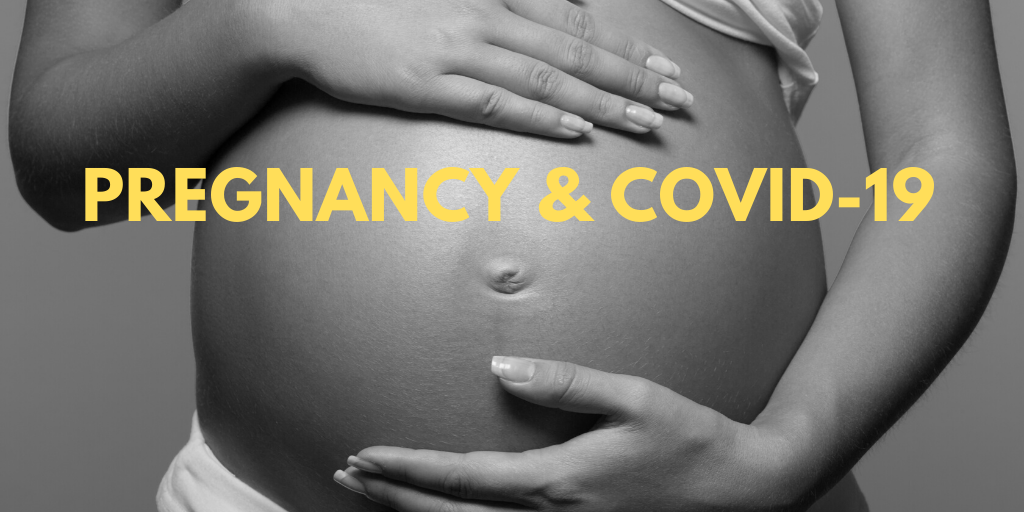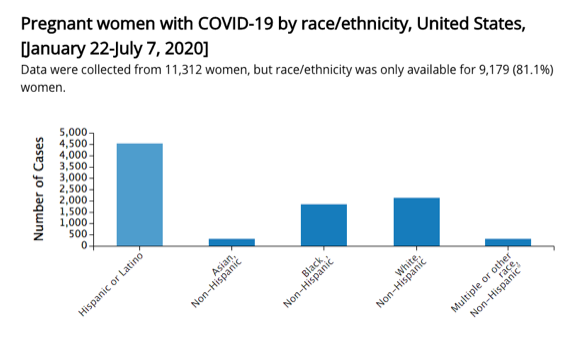
The CDC recently published a study asserting that pregnant women may be a particularly vulnerable population when it comes to COVID-19. You can view or download our full analysis of this study and the medical consensus on pregnancy and the virus here.
As of July 9, the CDC has tracked 11,312 cases of COVID-19 and 31 deaths among pregnant people with COVID-19.
Pregnant people with COVID-19 are disproportionately Latina and Hispanic.

After adjusting for confounding factors, the study concluded that pregnant women are 5.4 times more likely to be hospitalized and 1.5 times more likely to be admitted to the ICU. (Death rates between pregnant and non-pregnant women, however, seem to be similar.)
In response to this study, the CDC released a statement warning that pregnant people may be at an increased risk for severe illness from COVID-19. ACOG also released a statement in light of the new data brought forth by CDC and are currently considering modifications to clinical recommendations. In addition, a Paris case study recently demonstrated that COVID-19 could be transmitted to the fetus during pregnancy. Overall, this new data suggests pregnant women with COVID-19 should be followed closely for worsening disease and potential complications for the newborn.
So far, while COVID-19 is not an indication for a pregnant person to change their mind about their preferred route of delivery, a study in Spain that compared vaginal delivery and cesarean section in COVID-19 patients found the need for oxygen supplementation was higher for pregnant women with COVID-19 who delivered via cesarean section.
The bottom line is that is imperative that pregnant people avoid infection with COVID-19. That means people living in households or sharing pandemic bubbles with pregnant people need to make choices reflecting the fact that their pregnant friend or loved one is particularly vulnerable.
Once the baby is born, new parents should follow medical guidance if they choose to breastfeed. While medical experts currently continue to recommend breastfeeding, mothers with COVID-19 should wear a mask and practice proper hand hygiene while doing so to prevent transmission to the baby via respiratory droplets or skin contact.
Stay up to the date on the latest CDC data on pregnant people and COVID-19 here.
Pregnant Frontline Workers
Unfortunately, pregnant people are still among our frontline workers and continue to risk exposure to COVID-19, especially if their employers do not provide them with adequate personal protective equipment (PPE). During this unprecedented time, employers should protect pregnant workers’ health by accommodating their requests for workplace accommodations and PPE.
We Need Policy Change to Protect Pregnant People
Policymakers have a role to play, too. Though Philadelphia and Pittsburgh have laws and regulatory guidance requiring employers to accommodate pregnant workers’ health needs, Pennsylvania employers outside of Philadelphia and Pittsburgh are sometimes allowed to deny pregnant workers accommodations that they need. To prevent employers from putting pregnant workers’ health at risk, Congress should pass the Pregnant Workers Fairness Act, H.R. 2654, and our Pennsylvania state legislators should pass the Pennsylvania Pregnant Workers Fairness Act, HB1417. The need for these protections has never been more clear.
Author: WLP Intern Julian Tanjuakio
The Women’s Law Project is a public interest law center in Pennsylvania devoted to advancing and defending the rights of women, girls, and LGBTQ+ people in Pennsylvania and beyond.
July 2020: Our physical offices are still closed due to the pandemic but we are OPEN and working to serve your needs. Contact us here. Sign up for WLP’s Action Alerts. Stay up to date by following us on twitter, Facebook, and Instagram.
We are a non-profit organization. Please consider making a one-time donation or scheduling a monthly contribution.


